Top 7 Marine VHF Radio NZ Solutions for 2025
Staying connected at sea is not just a convenience; it's a critical safety requirement. For any mariner in New Zealand, from commercial fishing operators to recreational boaties, a reliable marine VHF radio is the most important piece of safety equipment on board. It's your primary link to shore-based stations, other vessels, and, crucially, emergency services. However, navigating the market to choose the right equipment while understanding your legal obligations can be a complex task.
This guide cuts through the noise, offering a comprehensive roundup of the top solutions for your marine VHF radio NZ needs. We will explore not only the best retailers to source high-quality, legally compliant hardware but also the essential training providers and official resources required to operate your radio safely and legally. This isn't just a list of products; it's a complete toolkit for ensuring your communications are clear, compliant, and dependable when you need them most. While our focus is on legal communication devices for navigation, understanding broader considerations for boat operations, such as understanding boat insurance for marine vessels, is also part of responsible marine activity.
Throughout this article, we’ll delve into seven key resources, from specialist marine electronics suppliers like Mr Marine and Read Marine to vital regulatory bodies such as Maritime New Zealand. Each entry will provide actionable insights, direct links, and a clear breakdown of what they offer, helping you make informed decisions. Whether you are outfitting a commercial fleet or simply ensuring your family’s weekend cruiser is safe, this guide will equip you with the knowledge to stay connected on New Zealand's waters.
1. Mobile Systems Limited: The All-in-One Specialist for Maritime & Fishing Industries
When sourcing a marine VHF radio NZ mariners can trust, Mobile Systems Limited stands out as a premier destination, particularly for those in the professional maritime and commercial fishing sectors. Rather than being a general electronics retailer, this platform operates as a specialist solutions provider, curating a robust selection of communication equipment specifically designed to endure New Zealand’s demanding marine conditions. Their expertise lies not just in sales but in delivering comprehensive, end-to-end communication systems that prioritise safety, reliability, and regulatory compliance.
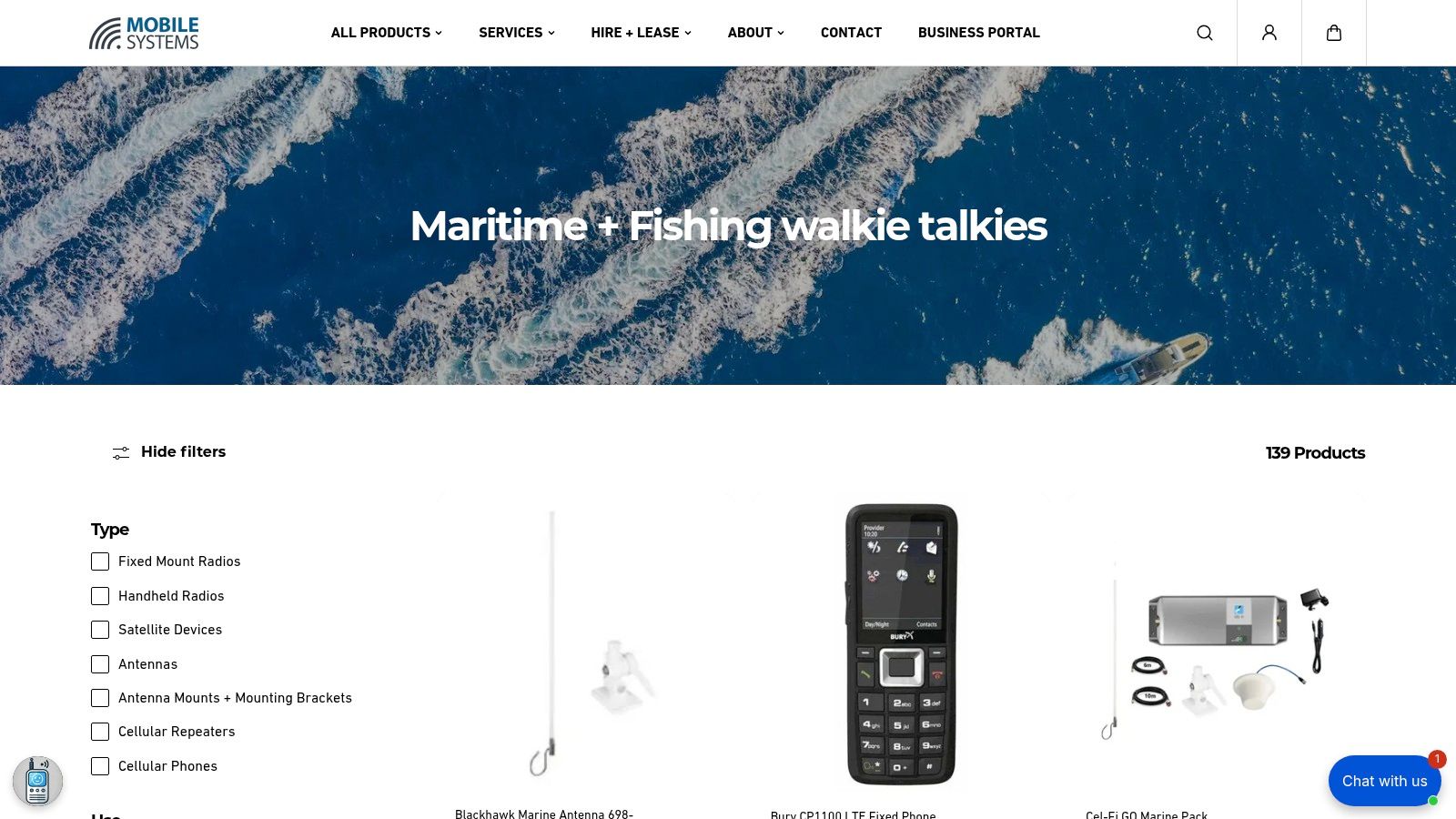
The core strength of Mobile Systems Limited is its deep, industry-specific focus. The product catalogue is built around globally recognised brands like Icom, Tait, Hytera, and Motorola, ensuring every piece of equipment meets stringent quality standards. This isn't just a shop; it's a hub for integrated solutions, from rugged fixed-mount radios for the helm to versatile handheld units for deck crews, all legally compliant for use in New Zealand waters.
Key Strengths and Capabilities
What truly sets Mobile Systems Limited apart is its holistic approach. They go far beyond simply shipping a product, offering a full suite of services that ensure the technology is implemented correctly and performs optimally from day one.
- Custom Network Design and Integration: For commercial operators with multiple vessels or complex communication needs, their team can design and implement a bespoke network. This ensures seamless, clear communication across a fleet, from ship-to-ship and ship-to-shore.
- Licensing and Programming: Navigating the complexities of radio licensing in New Zealand can be challenging. Mobile Systems Limited manages the entire process, from applying for the correct Maritime Mobile Service Identity (MMSI) number to programming your VHF radio with the necessary channels and user data, ensuring you are fully compliant with Radio Spectrum Management (RSM) regulations.
- Professional Installation and Maintenance: The company provides nationwide installation services, ensuring your radio and antenna are set up for maximum performance and longevity. Their ongoing maintenance and support services offer peace of mind, particularly for commercial vessels where communication failure is not an option.
Expert Tip: Before purchasing, use the "Ask an Expert" feature on their website. This allows you to detail your vessel type, typical areas of operation, and specific needs. Their team can then recommend a tailored package that includes the right radio, antenna, and any necessary licensing, saving you time and preventing costly mismatches.
Product Selection and Practical Use Cases
The website's collection is logically organised into categories like "Fixed Mount Radios," "Handheld Radios," and "Antennas," making it easy to find what you need. A commercial fishing vessel operating off the Chatham Islands, for example, could be outfitted with a high-power Icom fixed-mount radio for long-range communication, supplemented with several waterproof, floating Icom handhelds for crew members working on deck.
For added safety in remote offshore areas, Mobile Systems Limited also offers satellite communication devices, providing a critical backup when outside VHF range. This integrated approach, combining VHF, satellite, and high-performance antennas, makes them a one-stop-shop for creating a comprehensive safety and communication ecosystem aboard any vessel. While some custom solutions require professional consultation, this investment ensures your setup is perfectly aligned with your operational demands and built to withstand New Zealand's harsh maritime environment.
Visit the website: Mobile Systems Limited - Maritime & Fishing Collection
2. Read Marine
For boaties in the South Island, particularly around Dunedin, Read Marine stands out as a quintessential local expert in marine equipment. This specialist retailer has built a strong reputation by focusing exclusively on products designed for the demanding New Zealand maritime environment. Their deep-rooted expertise means they don’t just sell products; they provide trusted solutions tailored to the unique conditions Kiwi mariners face, making them a go-to source for a reliable marine VHF radio NZ.
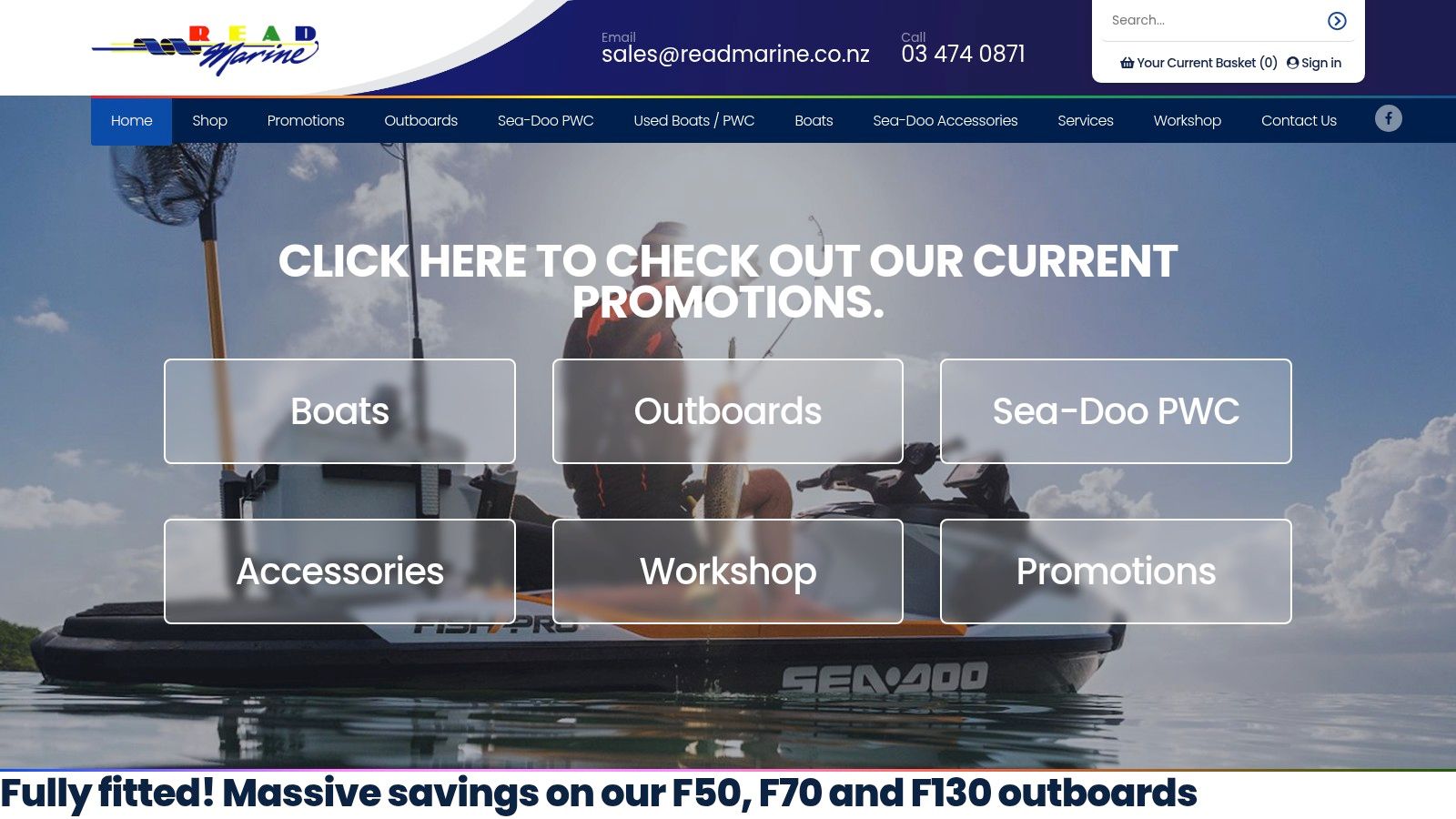
Read Marine’s approach is deliberately traditional and service-oriented. Instead of a sprawling online store, they focus on in-person consultation and sales from their Dunedin-based premises. This hands-on model allows customers to receive personalised advice, ensuring they purchase a radio that perfectly matches their vessel and usage requirements.
Product Selection and Expertise
While their online presence is for informational purposes, it effectively showcases their curated selection. A standout product often featured is the GME GX610 handheld radio, a popular choice for its floating, buoyant design and robust IP67 waterproof rating – ideal for smaller vessels or as a dependable backup in a grab bag. The website provides comprehensive details on such products, helping you research before you visit. Their specialisation ensures that every radio they stock is a legal communication device, fully compliant with NZ regulations.
Key Takeaway: Read Marine’s strength lies in its specialised knowledge and commitment to quality, offering products specifically chosen for New Zealand’s challenging marine conditions.
User Experience and Purchasing Process
The Read Marine website serves as a digital catalogue rather than an e-commerce platform. It’s clean, easy to navigate, and presents product information clearly. However, the key distinction is the purchasing process itself.
- No Online Checkout: You cannot purchase directly from the website.
- In-Store Pickup: All sales are finalised in their physical store in Dunedin.
- Expert Consultation: The process encourages direct interaction with their knowledgeable team, a significant advantage for those needing guidance.
While this may be a drawback for those outside Dunedin, it solidifies their position as a trusted local provider where customer service and expert advice are paramount. Their competitive pricing, combined with this level of service, offers exceptional value for those able to visit in person.
Website: https://www.readmarine.co.nz
Pros & Cons
| Pros | Cons |
|---|---|
| Deep expertise in marine-specific products. | Limited to in-store pickup only. |
| Detailed product info aids decision-making. | No online purchasing capability. |
| Competitive pricing on specialised equipment. | Geographic reach is limited. |
| Focus on gear suited for NZ conditions. | Smaller selection than major chains. |
3. Mr Marine
For those who prioritise the convenience of online shopping combined with the assurance of local support, Mr Marine is a leading digital destination. This online retailer specialises in a broad array of marine electronics, establishing itself as a key supplier for boaties across the country. Their core promise is delivering New Zealand-new products, ensuring every marine VHF radio NZ they sell comes with a full local warranty and service backing, a crucial factor for equipment that life may depend on.
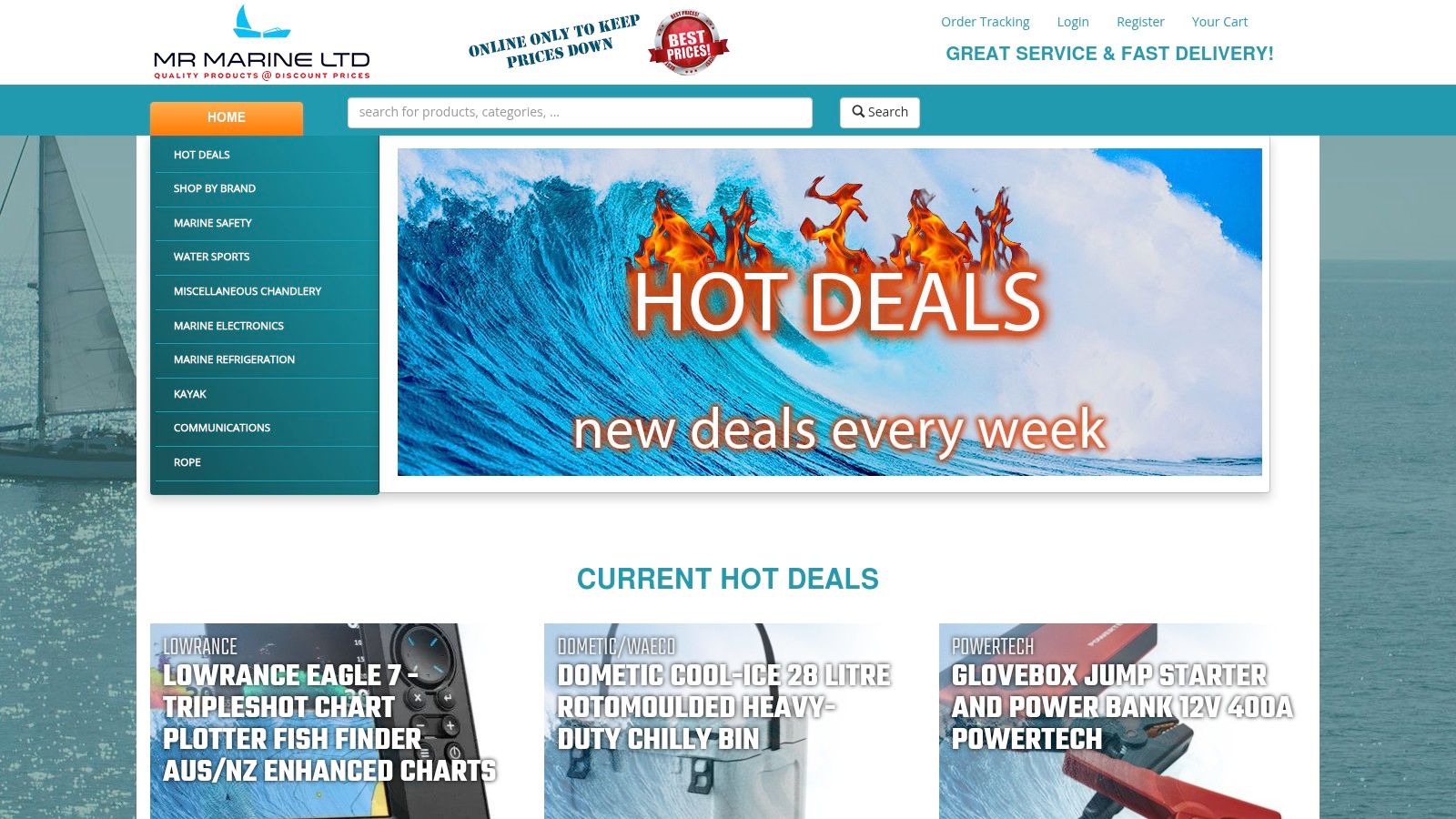
Mr Marine bridges the gap between the vast selection of an online store and the reliability of a local specialist. They understand that for critical safety equipment, after-sales support and genuine product sourcing are non-negotiable. This focus on supplying legal, NZ-compliant communication devices makes them a trusted choice for both recreational and commercial operators.
Product Selection and Expertise
The website showcases a comprehensive selection of VHF radios from reputable brands, with a clear emphasis on models proven in local waters. A frequently highlighted product is the Uniden UM355 VHF Marine Radio, known for its compact size and rugged, splashproof construction, making it an excellent choice for smaller trailer boats or as a primary fixed-mount unit on a variety of vessels. Mr Marine provides detailed specifications and features for each radio, empowering customers to make informed decisions from home. Their commitment to NZ-new products means you avoid the pitfalls of parallel imports, such as incorrect channel programming or lack of local service agents.
Key Takeaway: Mr Marine excels by combining a wide online selection with the critical assurance of New Zealand-new products, full local warranties, and nationwide support.
User Experience and Purchasing Process
The Mr Marine website is designed for a seamless e-commerce experience. It is well-organised, with clear categories and a powerful search function that helps you quickly find the specific radio or accessory you need. The purchasing process is straightforward and modern.
- Online Checkout: A full e-commerce system allows for easy and secure online purchasing.
- Nationwide Shipping: They offer convenient shipping directly to your door, anywhere in New Zealand.
- Clear Information: Product pages are detailed, and stock availability is clearly indicated.
This digital-first approach is ideal for customers who have already researched their needs and value the efficiency of online ordering. While it lacks the face-to-face consultation of a physical store, their accessible customer support via phone and email provides a reliable channel for pre-purchase questions and post-sale assistance.
Website: https://www.mrmarine.co.nz
Pros & Cons
| Pros | Cons |
|---|---|
| Convenient online shopping with nationwide delivery. | Limited physical presence for in-person advice. |
| Guarantees NZ-new products with full warranties. | May not suit those who prefer hands-on comparison. |
| Wide selection of marine electronics and radios. | Experience is primarily self-service online. |
| Strong focus on local service and support. | Less focus on installation services. |
4. Boating & Outdoors
For those seeking a blend of nationwide accessibility and a broad product range, Boating & Outdoors is a formidable player in New Zealand's marine retail landscape. With a cooperative network of 19 independently owned stores stretching from the top of the North Island to the bottom of the South, they offer a unique combination of local expertise and extensive buying power. This structure ensures that no matter where your boating adventures take you, expert advice on a compliant marine VHF radio NZ is likely just around the corner.
Boating & Outdoors caters to a wide spectrum of mariners, from casual weekend fishers to serious offshore enthusiasts. Their model supports both online research and in-person experience, allowing customers to browse a comprehensive selection online before heading to a local store for hands-on inspection and personalised guidance. This hybrid approach makes them a highly convenient and reliable choice for purchasing essential safety equipment.
Product Selection and Expertise
The key strength of Boating & Outdoors is the sheer breadth of its product selection. The website showcases a wide variety of legal communication devices from leading brands like GME, Uniden, and Cobra. You can find everything from compact, buoyant handheld units perfect for a kayak or dinghy, to powerful fixed-mount radios with advanced features like GPS and AIS for larger vessels.
Their online listings provide clear specifications, key features, and pricing, making it easy to compare models before you commit. For instance, you can easily evaluate the differences between a Uniden MHS157 handheld, known for its floating design and affordability, and a more feature-rich GME GX700 fixed-mount radio. This empowers you to make a well-informed decision based on your specific needs and budget.
Key Takeaway: Boating & Outdoors provides unparalleled convenience through its nationwide store network and a diverse online inventory, making it easy to find and purchase the right VHF radio anywhere in New Zealand.
User Experience and Purchasing Process
The Boating & Outdoors website is designed for straightforward navigation, functioning as a robust e-commerce platform. The purchasing process is flexible, catering to different customer preferences and offering a seamless user experience.
- Online and In-Store: You can purchase directly online for home delivery or opt to click-and-collect from your nearest store.
- Stock Visibility: When browsing online, you can select your local store to check for specific product availability, which helps manage expectations.
- Expert Access: The physical presence of their stores means you can easily supplement your online research with face-to-face advice from staff who are often passionate boaties themselves.
This flexibility removes the geographical limitations of smaller specialists. While stock levels can vary between individual stores, the ability to check online or call ahead mitigates this, ensuring a smooth and efficient purchasing journey for your next marine radio.
Website: https://www.boatingandoutdoors.co.nz
Pros & Cons
| Pros | Cons |
|---|---|
| Extensive nationwide network of 19 stores. | Stock availability can vary between locations. |
| Wide selection of brands like GME and Uniden. | Pricing may differ slightly from store to store. |
| Flexible online and in-store purchasing. | Not as specialised as dedicated electronics retailers. |
| Physical stores allow for hands-on viewing. | The online experience is good but not cutting-edge. |
5. Maritime New Zealand
Before purchasing any piece of marine electronics, understanding the rules that govern its use is paramount. Maritime New Zealand is the country's national regulatory, compliance, and response agency for the safety, security, and environmental protection of coastal and inland waterways. While it isn't a retailer, its website is arguably the most critical starting point for anyone looking to buy and operate a marine VHF radio NZ. It provides the authoritative framework for legal and safe communication at sea.
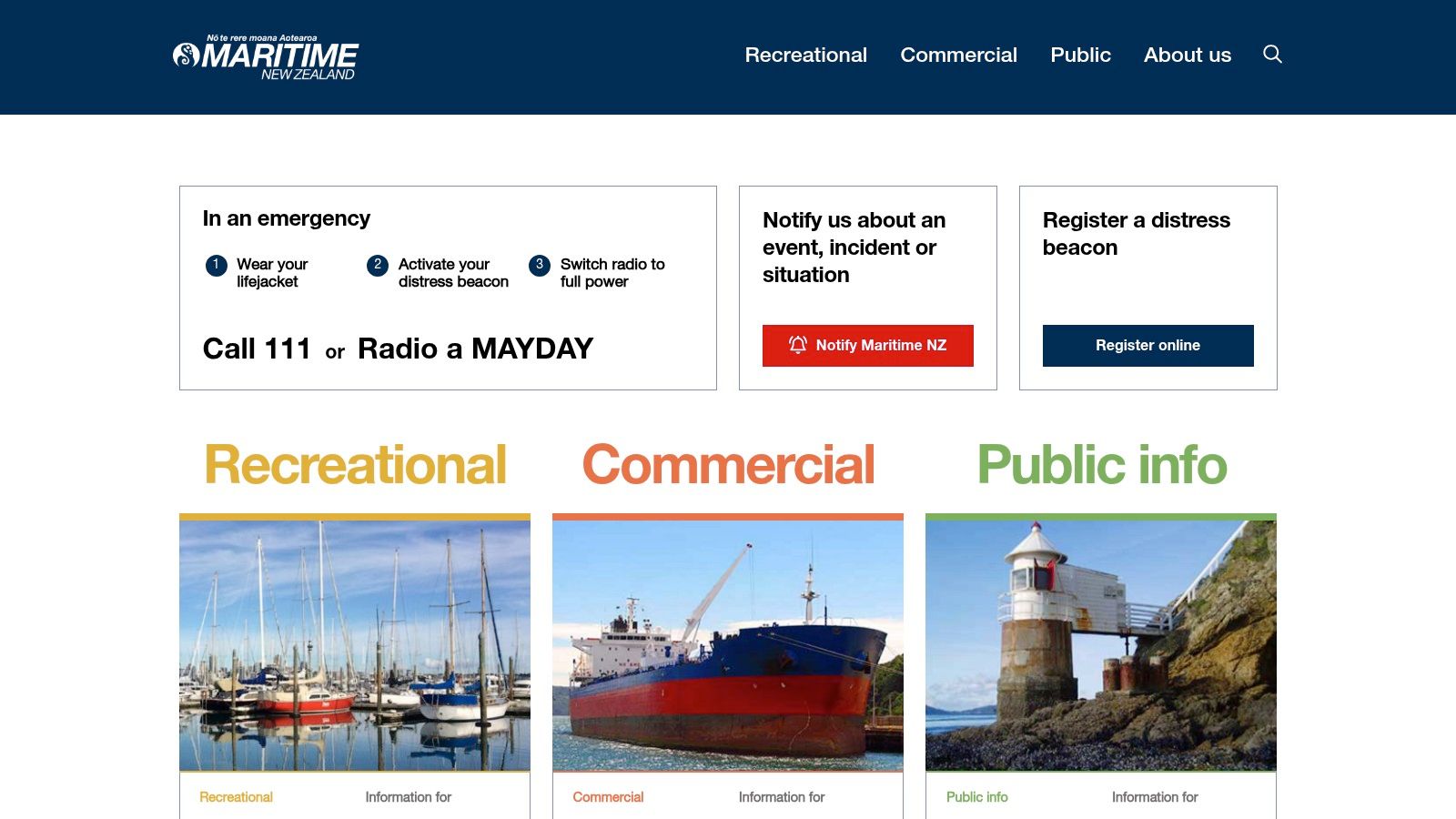
This government body sets the standards for all maritime activities, ensuring that every boater understands their responsibilities. Their online resources are essential for compliance, covering everything from licensing requirements to the correct distress call procedures. For any Kiwi mariner, consulting this website is a non-negotiable step in ensuring their communication equipment is not only functional but also a fully legal communication device.
Product Selection and Expertise
Maritime New Zealand does not sell hardware. Instead, it offers something far more valuable: information and regulation. The website is a comprehensive knowledge base dedicated to the safe use of marine radios. It details the types of radios permitted for use in New Zealand waters, outlines the process for obtaining a Maritime Mobile Service Identity (MMSI) number for DSC-capable radios, and explains the legal requirements for a radio operator's licence.
By exploring their resources, you gain a deep understanding of what features are necessary versus what are simply nice to have. This knowledge empowers you to make a much more informed purchasing decision when you visit a retailer.
Key Takeaway: Maritime New Zealand is the definitive source for all legal and safety information, ensuring your use of a marine VHF radio is compliant and effective.
User Experience and Purchasing Process
The Maritime NZ website is structured as an informational portal. It is clean, professionally designed, and organised logically, making complex regulatory information accessible to the average boatie. The site is optimised for finding specific rules and guidelines quickly.
- No Products for Sale: The site is purely for information, regulation, and licensing.
- Essential Licensing: It is the official channel for applying for your vessel’s call sign and MMSI number.
- Safety First: The primary focus is on providing resources to prevent incidents and ensure effective communication during emergencies.
While you cannot buy a radio here, the information you will find is a prerequisite for using one legally. It is an indispensable resource that complements the commercial offerings of retailers by providing the crucial "how-to" and "why" behind marine radio communication.
Website: https://www.maritimenz.govt.nz
Pros & Cons
| Pros | Cons |
|---|---|
| Authoritative and official source of information. | Does not sell products directly. |
| Essential for legal compliance and licensing. | Content is regulatory, not product-focused. |
| Comprehensive safety guidelines and best practices. | Can be dense for complete beginners. |
| Clearly outlines requirements for NZ mariners. | No customer support for hardware issues. |
6. Coastguard Boating Education
Before you even transmit on a new device, it's crucial to understand that operating a marine VHF radio in New Zealand requires a legal qualification. This is where Coastguard Boating Education becomes an indispensable resource. While not a retailer of hardware, this platform is arguably the most important starting point for anyone serious about maritime safety, offering the essential Maritime VHF Operator’s Certificate required by law for all users. Their nationwide programme ensures every boatie can access the training needed to use a marine vhf radio NZ legally and effectively.
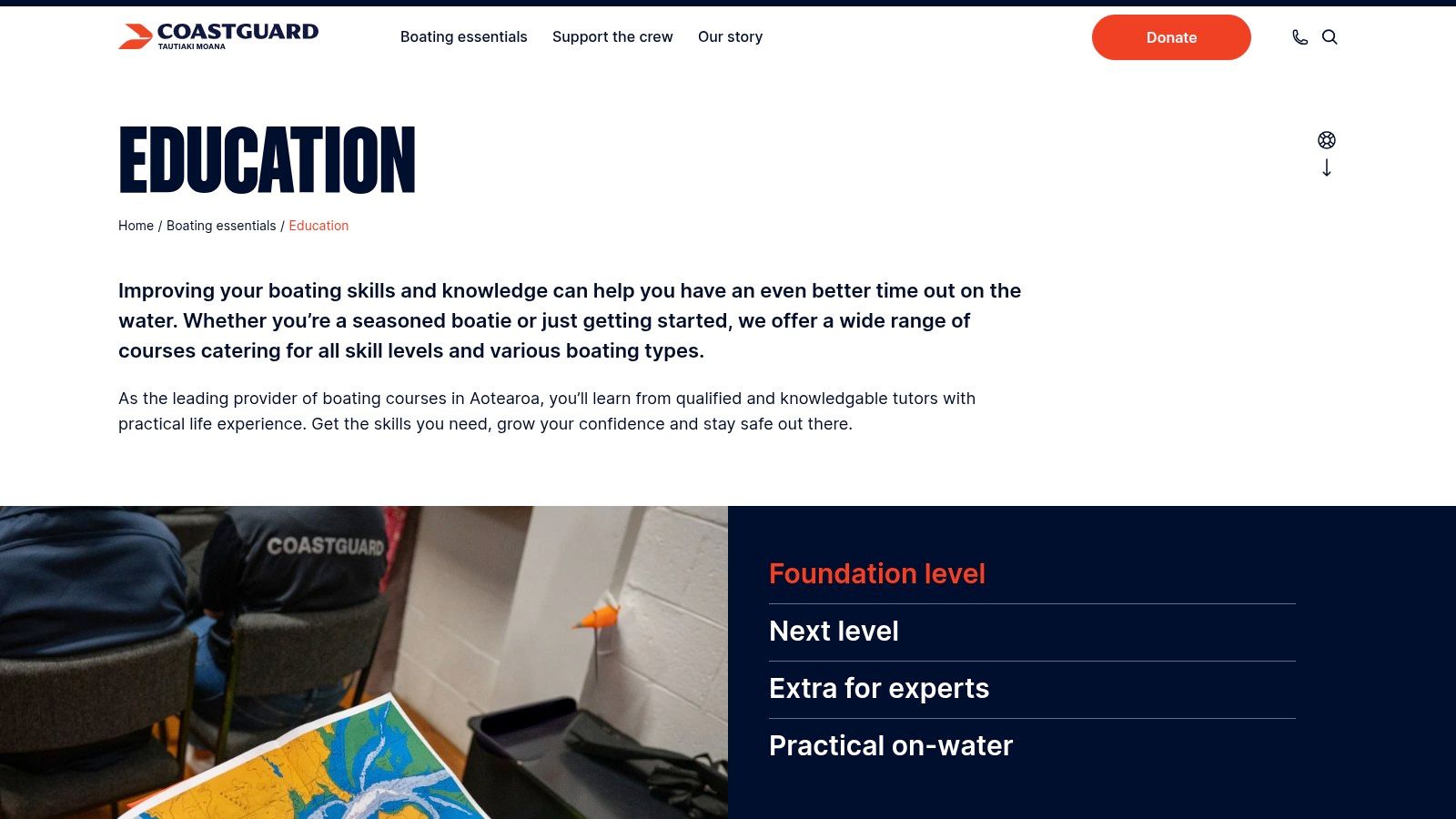
Coastguard Boating Education provides the foundational knowledge that turns a radio from a simple piece of equipment into a life-saving tool. The courses cover correct channel usage, distress call procedures (Mayday, Pan Pan, Sécurité), and the protocols for everyday communication, ensuring the airwaves remain clear for emergencies. This training is not just a regulatory hurdle; it's a vital component of responsible vessel management.
Product Selection and Expertise
The "product" here is not a physical radio but the official Maritime VHF Operator’s Certificate course. Coastguard Boating Education is the leading accredited provider in New Zealand, offering flexible learning pathways to suit different needs and schedules. You can choose from traditional classroom-based sessions held across the country or a comprehensive online course that allows you to study at your own pace. The certification is a one-off requirement and remains valid for life, making it a crucial, long-term investment in your safety at sea. The course content is specifically tailored to NZ's maritime environment and regulations.
Key Takeaway: Coastguard Boating Education provides the mandatory legal certification and practical knowledge needed to operate any marine VHF radio in New Zealand, making it a fundamental first step for all boaties.
User Experience and Purchasing Process
The Coastguard Boating Education website is designed to make enrolment simple and accessible. The interface is clean, professional, and provides clear information on course content, locations, and schedules. The purchasing process is straightforward for enrolling in a course.
- Online Enrolment: You can easily find and book a course directly through the website.
- Flexible Options: Choose between online self-study or in-person classroom courses.
- Nationwide Coverage: Classroom courses are available in numerous locations throughout New Zealand, making them accessible to most of the population.
While the primary cost is the course fee, which includes the exam and certificate, this investment is non-negotiable for legal compliance. Completing this training ensures you are not just buying a radio, but are fully equipped with the knowledge to use it correctly when it matters most.
Website: https://coastguard.nz/education
Pros & Cons
| Pros | Cons |
|---|---|
| Provides essential certification for legal operation. | Course fees apply (it is a necessary expense). |
| Flexible learning with online and classroom options. | Does not sell radio hardware. |
| Courses are recognised nationwide. | Requires time commitment to complete. |
| Deepens understanding of critical safety procedures. | Certification is for the operator, not the radio. |
7. Power Boat Magazine
While not a retailer, Power Boat Magazine serves as an indispensable educational resource for any Kiwi boatie considering a new marine VHF radio NZ. This platform distinguishes itself by providing in-depth articles, comprehensive buying guides, and expert analyses, empowering users to make highly informed purchasing decisions rather than simply facilitating a transaction. It’s a crucial first stop for understanding the technology before you commit to buying.
The magazine’s content is tailored specifically for New Zealand’s boating community, addressing local regulations, conditions, and product availability. By focusing on education, it fills a critical gap, helping mariners understand the nuances between fixed and handheld units, the importance of features like DSC (Digital Selective Calling), and what constitutes a legal communication device in NZ waters.
Product Selection and Expertise
Power Boat Magazine excels in its role as an impartial guide. Instead of stocking products, it provides detailed reviews and comparative articles on various models available in the New Zealand market. Their content often breaks down complex technical specifications into easy-to-understand advice, covering topics like antenna selection, battery life for handhelds, and the integration of VHF with other onboard electronics like GPS.
This expert-led content ensures you learn what to look for in a VHF radio, from power output levels to waterproofing standards (IP ratings). This knowledge is invaluable, allowing you to walk into a retailer with confidence, knowing exactly what features will best suit your vessel and intended use, whether you're a coastal cruiser, an offshore angler, or a weekend adventurer.
Key Takeaway: Power Boat Magazine is a premier source of expert knowledge, offering comprehensive guides that help you navigate the complexities of choosing the right marine VHF radio for NZ conditions.
User Experience and Purchasing Process
The Power Boat Magazine website is designed as a content-rich digital publication. It is well-organised, with articles that are easy to find and read, making the research process straightforward and enjoyable.
- No Products for Sale: The platform is purely informational and does not sell any hardware directly.
- Free Access to Information: All buying guides and articles are freely accessible, providing incredible value at no cost.
- Informed Decision-Making: The primary goal is to equip you with knowledge, guiding you toward a smart purchase from a dedicated marine retailer.
While you cannot buy a radio here, the insights gained are a fundamental part of the purchasing journey. Using this resource ensures you invest in a device that is not only compliant with NZ maritime law but also perfectly aligned with your safety and communication needs on the water.
Website: https://www.powerboatmagazine.co.nz
Pros & Cons
| Pros | Cons |
|---|---|
| Expert advice and comprehensive insights. | Does not sell products directly. |
| Helps inform decisions regarding marine VHF radios. | Content is article-based, not a store. |
| Tailored for New Zealand boating enthusiasts. | Requires a separate retailer for purchase. |
| In-depth comparative analyses of products. | Updates may be less frequent than retail sites. |
Marine VHF Radio Coverage: Top 7 NZ Sources Comparison
| Item | Implementation Complexity 🔄 | Resource Requirements ⚡ | Expected Outcomes 📊 | Ideal Use Cases 💡 | Key Advantages ⭐ |
|---|---|---|---|---|---|
| Mobile Systems Ltd | Medium to High | High (custom network design, installation, maintenance) | Reliable, durable marine communication; enhanced safety | Commercial fishing, maritime transport in NZ coastal/offshore | Comprehensive solutions; durable & advanced tech; expert local support |
| Read Marine | Low | Low (select marine radios in-store) | Quality marine VHF radios tailored for NZ conditions | Buyers seeking marine-specific radios with expert advice | Specialized marine products; detailed info; competitive pricing |
| Mr Marine | Low to Medium | Moderate (online platform, local support) | Convenient access to broad marine electronics with warranty | Online buyers wanting NZ-new products and nationwide support | Wide product range; online shopping; full local support |
| Boating & Outdoors | Low to Medium | Moderate (network of stores plus online) | Broad selection of marine equipment; hands-on experience available | Customers wanting flexibility between online shopping and physical stores | Extensive range; multiple store locations; in-store consultations |
| Maritime New Zealand | Low | Low (informational resource) | Authoritative safety and compliance guidance | Mariners needing official radio usage and licensing info | Official, reliable guidelines; safety-focused |
| Coastguard Boating Education | Medium | Moderate (course fees, study time) | Certified VHF radio operators complying with NZ law | Individuals requiring accredited operator certification | Accredited courses; flexible online/in-person learning options |
| Power Boat Magazine | Low | Low (reading materials, online access) | Informed purchasing and maintenance decisions | Boaters seeking expert advice and buying guides | Expert insights; comprehensive marine equipment articles |
Setting Your Course for Clear and Compliant Communication
Choosing the right marine VHF radio is a cornerstone of safe boating in New Zealand’s diverse and often challenging waters. Throughout this guide, we have explored the essential hardware, legal requirements, and expert resources available to Kiwi boaties. The journey from selecting a device to using it confidently on the water is a multi-step process, and getting each step right is crucial for your safety and the safety of those around you.
The key takeaway is that purchasing a radio is only the beginning. A truly effective communication system integrates three core components: the right equipment, the correct knowledge, and full legal compliance. Simply having a top-of-the-line radio stowed away is not enough; you must be prepared to use it correctly in both routine and emergency situations. This preparedness is what transforms a piece of hardware into a lifesaving tool.
Your Final Checklist for VHF Readiness
Before you cast off, let's crystallise the most important action points from our discussion. Consider this your final pre-departure check for ensuring your communication strategy is as seaworthy as your vessel itself.
-
Select Fit-for-Purpose Hardware: Your choice of a fixed-mount or handheld marine VHF radio should be dictated by your vessel size, your typical journeys, and your specific needs. As we’ve seen from suppliers like Mobile Systems Ltd and Read Marine, features like DSC, GPS integration, and AIS receivers are no longer niche luxuries but are becoming standard safety tools. Don't just buy the cheapest option; invest in a unit that offers the reliability and features you’ll need if conditions turn sour.
-
Prioritise Legal Certification: Obtaining your Maritime VHF Radio Operator Certificate is non-negotiable. As highlighted by Coastguard Boating Education, this qualification ensures you understand the correct channels to use, the proper distress call procedures (like Mayday, Pan-Pan, and Sécurité), and the legal framework governed by Maritime New Zealand. An uncertified operator can inadvertently cause confusion or interfere with a genuine emergency, making proper training an ethical responsibility.
-
Embrace Continuous Learning: The maritime environment is dynamic, and so is the technology. Staying informed through resources like Power Boat Magazine or consulting with experts at places like Mr Marine and Boating & Outdoors keeps your knowledge current. Understanding how to properly log a trip report with Coastguard Radio or knowing the latest updates from Maritime New Zealand are practices that distinguish a responsible skipper.
Navigating Your Next Steps
Your path forward is clear. First, assess your current setup. Do you have a marine vhf radio nz unit that meets modern standards? Is it correctly installed and programmed with your vessel’s MMSI number? If not, revisit the suppliers and experts mentioned in this article to find a device that suits your needs.
Next, address your qualifications. If you or your crew lack the official operator's certificate, make enrolling in a course with Coastguard Boating Education your immediate priority. The confidence you gain from this training is invaluable and ensures you are an asset, not a liability, on the water.
Finally, make compliance and best practices a part of your routine. Regularly test your radio, keep it maintained, and ensure you are familiar with the local VHF channels for your boating area. By integrating these elements, you build a comprehensive safety net that extends far beyond the physical radio unit itself. You are not just installing a device; you are embracing a culture of safety, responsibility, and clear communication that defines a true Kiwi mariner.
Ready to equip your vessel with a reliable, legally compliant communication solution? The experts at Mobile Systems Limited specialise in providing and installing a comprehensive range of marine VHF radios tailored for New Zealand's unique conditions. Explore their fit-for-purpose solutions and ensure your next trip on the water is a safe one by visiting Mobile Systems Limited.


